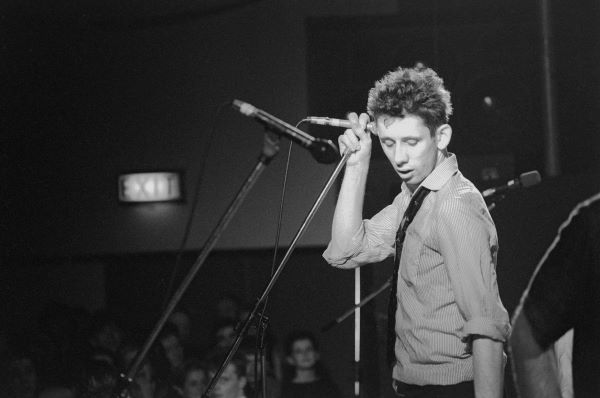
The ornery, brilliant, and frequently drunk Shane MacGowan of the seminal Irish punk/folk/kitchen-sink band the Pogues takes the spotlight in this documentary by Julian Temple.
Temple is perhaps best known as the director of the Sex Pistol’s film The Great Rock ’n’ Roll Swindle and a subsequent documentary on the band, The Filth and the Fury. In those cases, Temple’s freewheeling style meshed with that of the bands. Here, it doesn’t quite hit the mark.
The first hour is basically a run-up of the singer/songwriter’s life before he formed the Pogues, and Temple attempts to place him within the political and social context of the 1970s and ’80s. Since MacGowan didn’t want Temple interviewing him, or even have him around, the director got the musician’s friends and associates to do the honors, which include Johnny Depp, Sinn Fein leader Gerry Adams, Primal Scream’s Bobby Gillespie, and MacGowan’s wife, Victoria Mary Clarke.
That’s fine enough, and the Adams interview is particularly compelling as he discusses the British presence in Northern Ireland and the violence that has resulted from it. Temple also cobbles together audio interviews of MacGowan from over the years and uses them as voice-over, which he has Depp play before MacGowan on camera. Depp, though, never really follows up on any of the statements MacGowan makes on the tapes; he’s just happy to hang with his buddy. This result in an interminable amount of shots of MacGowan staring into space apparently listening. Sometimes he looks pensive, or maybe he’s just loaded, you can’t tell. It’s extraordinarily odd, and it slows the film down considerably, which is deadly because it is two hours long.
Since there’s a lack of footage of the musician’s life before punk rock came to be, Temple turns to animating aspects of MacGowan’s life and archival footage. Again, it’s a heavy lift, and it doesn’t work as well as it does in, say, the recent documentary Zappa.
Once punk hits though, the excitement level goes up dramatically, partially because punk is Temple’s oeuvre and the scene in which he came up, and partially because this period is the starting point in MacGowan’s career. He overcomes his depression—growing up in England, displaced from Ireland—when he finds an outlet for his expression.
Once the Pogues are in the picture, MacGowan finds his voice, and the Pogues were an absolutely fierce live band. Even when he leaves the group, his creative restlessness and sense of purpose doesn’t dissipate. So, the second half has momentum and drive that the first half lacks. That would be a minor point if the movie wasn’t long. In essence, the film is a bit of a slog. Losing a half hour of it would improve it greatly.
Still, MacGowan is a unique artist worth learning about, and Temple gives you plenty of MacGowan and his music. This alone makes Crock of Gold worth checking out.






Leave A Comment